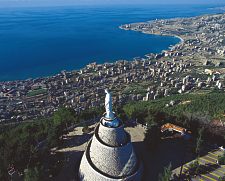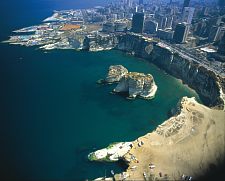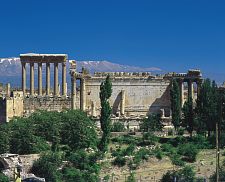|





| |
The Birth of Outrage
Dedicated to the memory of Gebran Tueini
by Don Quixote*
CDL | December 19, 2005
[Text
in PDF]
One week after the assassination of the most outspoken pro-Independence Member
of Parliament in Lebanon, martyr Gebran Tueini, the Lebanese political scene
seems more divided than ever and Lebanon risks losing its newly acquired
independence from Syria.
We all like to say that Gebran’s legacy, the nobleness of his spirit, the
clarity of his words, the virtue of his beliefs and the courage of his
convictions will inspire us all for generations to come. We all like also to
stand by the giant Ghassan Tueini, the beacon of light, forgiveness and wisdom
in the darkness of our ignorant Middle East and heed his call to burry with
Gebran our hate and forego our revenge and grudges. But can we? How?
Amidst the total absence of official accountability at all levels from the
President of the Republic, to the Prime Minister, to the Minister of the
Interior, the Lebanese people are treated by their leaders to more divisions,
less responsibility and a menu of empty rhetoric, from all sides, ridden with
conflict and misleading at best.
These divisions and this hyped rhetoric would be more than welcome in any
democracy, where the people are unified, the nation is one and the divisions
revolve around internal matters; but not in Lebanon. In Lebanon it seems the
people are still divided around the finality of the nation and the brotherhood
of its citizens. Their divisions seem so fundamental and constitutional; they go
to the core and appear to reach as far as opposing the country’s independence by
some “Lebanese” groups.
Political discussions in Lebanon rarely take place between political adversaries
without evolving, rather expediently, into a verbal fist-fight between them
turning them into ideological enemies incapable of tolerating each other, and
sometimes going as far as exchanging hateful labels, killing one another and
blaming the victim.
Gebran Tueini’s fault was that he dared to believe in the freedom of his speech
and dared to say openly to his political opponents what he believed without
fear. He believed in them as civic partners in a nation for all. They hated him,
they hated his words and they hated his opinions. They caricatured his face into
that of a Jewish Rabbi and placed it inside the Star of David to be displayed
for all to see in the Southern Suburb of Beirut and in Nabatieh, South of
Lebanon where people are fed anti-Semitism on a daily basis by a bigoted
leadership. They made Gebran the enemy!
Gebran’s fault was that he, as most Lebanese, peacefully disagreed with their
politics and their unilateral wars and called openly for their armed militia,
outlawed under international law, to give up its arms.
Gebran’s fault was that he demanded of the Syrian puppet occupying the Baabda
Palace to resign and allow for the elections of a free Lebanese President to
take place.
Gebran’s fault was that he peacefully fought for a “Free, Sovereign and
Independent Lebanon”, a formula refused by Syria and its agents in Lebanon (or
allies, as they call themselves) and perhaps by Israel and its Syrian agents (or
allies) too.
If these demands are what made Gebran Tueini a Zionist in the eyes of a bigoted
few, then most Lebanese if not all, have become Zionists.
... Yes we will burry with Gebran the hate and we will hold no grudges as Abu-Gebran
asked us to do but we will not burry the truth and we will hold even higher the
banner of Freedom, Peace and Democracy for Gebran’s memory, until all the
despotic regimes in the backward Middle East and their satellites and tentacles
in Lebanon crumble.
It will be a free, independent and sovereign Lebanon for all… or it will NOT be
for anyone.
The ordinary Lebanese, as they look at what is happening around them demand
answers. Most of them are unsophisticated and prefer an argument that offers a
linear non-convoluted analysis from the perspective of the ordinary Lebanese who
is asked time and again to sacrifice property, limb, life or dear ones in the
absurd wars of ideologies on this blood-thirsty land. All they have today are a
few questions to the many stakeholders in their fate.
The Amal-Hezbollah Boycott
Without dancing around the bushes and without giving the litany of eulogies and
praises to the resistance movement to immunize the questions against “labels of
agency”, let us begin by addressing the Amal-Hezbollah ministers and the
Hezbollah leadership and ask them… why?
Why would Hezbollah organize a rally on March 8th, 2005 to thank Syria for what
it did to Lebanon when most of Lebanon intuitively knew (and now the
international investigations confirmed their intuition) that Syria was behind
the assassination of Prime Minister Rafik Hariri? Are Syria’s interests a more
strategic priority to Hezbollah than its union and unity with the rest of the
Lebanese?
Why would the Amal-Hezbollah ministers refuse to stand with Prime Minister
Seniora against a gratuitous attack on him by Bashar Assad? On the other hand
they hastened to defend the Iranian President Ahmadi Najad as he was criticized
by the world for his outlandish remarks about the Jews? Is PM Seniora an agent
of the enemy and therefore he deserved to be attacked by Assad, and perhaps
tomorrow to join, God forbids, his partners in crime Tueini and Hariri? Is
Ahmadi Najad closer to Hezbollah as an Iranian Shiite than Fouad Seniora is as
the Prime Minister of Lebanon? Or is Hezbollah more ready to defend Iran and
Syria than it is willing to defend Lebanon?
It is paradoxical for Hezbollah (and when we say Hezbollah, we mean both Amal
and Hezbollah since Hezbollah seems to be the driving force for both) to insist
on unilateral control of its arms and its decision to attack the enemy,
excluding all other Lebanese from the process; yet, on the other hand, its
ministers insist on decision by unanimous agreement on everything else that
takes place in the country, even when the constitution has promulgated a process
by majority vote for the Cabinet.
For the last 6 months many Lebanese have been trying to stomach the idea of an
armed militia - at the heart of a free and sovereign nation and in opposition to
international law - that insists on keeping full control of its arms to the
exclusion of all other groups under the rubric of a national resistance. Many
Lebanese are non-partisans and they struggle to understand the motives behind
Hezbollah’s arms and often wonder about the agenda of the Party of God and how
those two would serve Lebanon’s future as a nation and its evolving sovereignty
as an independent country. They look for answers in the rhetoric and actions of
Hezbollah’s leadership but cannot find a righteous one. What Hezbollah has
exhibited since 2000 are only dubious national motives and a questionable
sectarian agenda. It seems to have taken the largest sect in Lebanon hostage of
its pro-Syrian policies and it remains to be determined if Hezbollah is planning
to take all of Lebanon and its government hostage on behalf of Syria and Iran.
This is what it looks like for the naïve observer and most citizens are naïve
observers. Educate us intelligently if we are in the wrong.
As ordinary Lebanese citizens, we ask these questions with no hidden agenda
simply trying to understand; perhaps we can sympathize - so those of you in the
business of labeling opposing views and inquiring opinions as enemy-serving keep
your hate rhetoric to yourselves.
The Prime Minister
The Lebanese people hold Mr. Seniora’s Cabinet accountable for the loss of
property, blood and lives of Gebran Tueini, May Chidiac, Elias El-Murr, and the
hundreds of other freedom-loving and innocent Lebanese who were targeted by
terrorism since he took office.
Most Lebanese know that PM Seniora means well and have no doubts about his
patriotism and devotion to the independence of their nation or the protection of
its citizens, all of its citizens. Yet they find day after day that he is unable
to provide them with a basic modicum of protection from an enemy that has never
left their country and continues to ravage their lives and their livelihoods.
Mr. Seniora, the Lebanese people ask you today in the name of Lebanon’s martyr
Rafic Hariri: Do you know if Syria (regime or local agents) is behind these
attacks? The Lebanese people already know the answer to this question and it is
YES. But they want to hear it from you and see you take action to stop it. Take
action under UNSC Res. 1559, which demands that Syria stops intervening in
Lebanese affairs, let alone perpetrating terrorism on the Lebanese populace and
assassinating Lebanese leaders. Syria did not fulfill yet UNSC Res. 1559 and
perhaps this is a major reason why Hezbollah’s first condition to release the
Shiite Ministers from the bondage of its boycott is for the Lebanese Cabinet to
consider fulfilled Res. 1559.
In the matter of the international court to try the terrorists in the
assassination of Hariri, most Lebanese agree on the need for an international
court but most of them also note that you fumbled the issue internally by not
giving the Amal and Hezbollah ministers enough time to convince their
constituent base of the need for such a court and dissipate any fears in their
community perpetrated by the pro-Syrian camp. Your cabinet should have at least
strived to keep the ministers united behind the coffin of Gebran Tueini (even if
only for the sake of appearances) and taken up the issue of the international
court at a later date. Enough time should have been given to educate the public
on this issue by professional experts. The Lebanese public, with all due respect
to its potentials, has been in the Assad School of thought for 30 years, which
has undoubtedly affected its IQ. Therefore, public education was warranted; the
process is a long one anyway and the UNSC is not going anywhere, so it could
have waited a month more.
Now, it is too late to reverse history. If the Amal-Hezbollah ministers are
willing to come back without pre-set conditions, they should be welcome. If they
refuse, then most Lebanese including a growing number of Shiites tired of
outmoded notions of heroism, would approve replacing them by willing qualified
Shiites from outside these two political groups.
The debate whether decisions of national magnitude at the level of the cabinet
should be taken by majority vote or unanimity (bizarre as the latter may seem
but this is what the Amal-Hezbollah ministers seem to be asking for), is a
constitutional debate that does not belong to the PM or his cabinet but is
better left for the Supreme Judicial Council (surprisingly suspended!) to
interpret the constitution, or to the legislature to amend the constitution in
this regard. Beware of setting the wrong precedent!
The Speaker
Mr. Berri, the Lebanese people thank you for your kind words about Deputy Tueini
but also hold you accountable for the outbreak of terrorism in Lebanon. As
President of the Council of Deputies, they ask you to convene a confidence
hearing for the Seniora Cabinet and ask its ministers the following:
1) Why has the minister of Interior failed to protect the Lebanese
people? The citizens need to know if the failure is in the laws on the books, in
their implementation, in the lack of resources, in the lack of cooperation, in
the lack of leadership on the part of the Interior Minister or in the
unwillingness of the newly appointed security systems to do their job.
2) Why did the ministers of Amal and Hezbollah boycott the cabinet
meetings? Certainly Mr. Berri, you were part of the decision to boycott, and the
people need to hear and know the opinion of their speaker and his parliamentary
bloc on the subject.
The situation is very dangerous Mr. Speaker and will not tolerate any further
delay. The boycott has taken a sectarian tone and risks creating a new rift in
the Lebanese society and plunging the country in a new sectarian war, which will
only serve the interests of Lebanon’s enemies and which will spoil the
achievements of the martyrs who gave their lives for a free, independent and
sovereign Lebanon. In the name of all that you hold holy, they ask you to end
this boycott and forego any sectarian interests for the sake of Lebanon. If you
cannot do it, please tell us why. As Speaker, you owe us all an explanation.
The Opposition
And by this I mean the parliamentary opposition; the group of MPs whose
parliamentary bloc, led by General Michel Aoun, chose to stay outside the
cabinet. This opposition is lacking the legislative initiative to build
consensus around its program (if any) or to meaningfully reach out to other
groups beyond its initial voter base, on the contrary it may be loosing grounds
to chaos and it looks as if it has lost the compass.
Instead of staying above the fray and playing a mediation role, General Aoun
chose to take sides in the current conflict within the Cabinet and many see him
as having taken the wrong side in direct opposition to the wishes and
aspirations of his constituents. The overwhelming support that Michel Aoun had
in the spring of 2005 among many voters in Jbeil, Keserwan, Metn and Zahlé is
eroding day after day.
Many activists in his Free Patriotic Movement (FPM) see in that a natural
fluctuation that takes place within the base of any party or movement in a
democracy (except of course in the Syrian World, where the Baath has enjoyed
constant support for more than 30 years).
However, the FPM base does not hide fears that the “Reform and Change”
parliamentary bloc has shifted camps and drifted away from the independence
movement to join the rank of the pro-Syrians and subsequently give a Lebanese
cover to some “non-Lebanese” entities alienating thereby many constituents.
Others who label themselves “former Tayyar supporters” confirm this guess and
relate the erosion to the surprising shift in the General’s position on key
national issues particularly his open alliance with pro-Syrian parties in
Lebanon, namely Hezbollah and the National Syrian Socialist Party; in addition
to the apparent rift between the FPM and the independence movement of March
14th, 2005.
Many of the FPM supporters feel that Mr. Aoun is asking them to swim in the
wrong national pool and they stop short of accusing the General of a policy
driven solely by selfish presidential aspirations. They hope that he has a
strategy for continuing the independence process of 2005 better than the one he
had in 1989 when he initiated the Liberation War, but they fear he may be
allying himself with the wrong partners once again. In 1989, the General and his
“think-tank” chose to ally themselves with Saddam Hussein against the World.
Today their allies seem to fit the same profile.
Mr. Aoun, those who voted for you, when they did, were moved by the clarity of
your vision for a free and independent Lebanon and wanted to give you a chance
to realize it. Today this vision is blurred and your leadership cannot be
sustained on shaky principles. Your constituents require from you a clear
strategy and a defined set of principles. If you just want to get to Baabda, you
can at least help to clean it from the Syrians. You owe it to the voters!
To The Terrorists: If you thought that by killing
Gebran Tueini, you silenced the voice of freedom in Lebanon, you were wrong. His
assassination revived in us the fire of revolution and gave a pen, a paper and a
candle of hope to every freedom-loving person in this eternal nation.
Gebran, rest in Peace my friend; we will never give up!
* The voice of one… Or maybe of thousands!
|